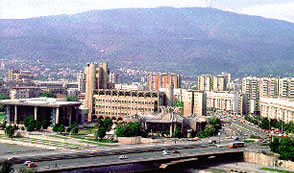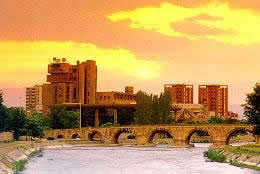| After the 1963
earthquake, Skopje was a centre of new urban plans and architectural activity.
A number of architects of international reputation — Tange from Tokyo,
Van der Broeck and Backem from Rotterdam, Pinzinatto from Rome, teams of
architects from Warszaw and Athens, Ravnikar from Ljubljana and Venzler
and Mishevich from Zagreb — worked on the new urban plan of the stricken
town and stimulated the extension of architectural views characteristic
of the Macedonian capital. During the renovation of Skopje, some established
architects acquired additional recognition, and new names emerged as well:
Ladinska, Smilevski, Gjurich, Kjoseva, Bogachev and Simoski.
Towards the middle of the 1960s, a group
of Skopje-educated architects was formed, a new generation which marked
its presence with a number of modern buildings inspired by contemporary
architectural theory. Among this post-earthquake group are Ljubinka Malenkova,
Georgi and Janko Konstantinovi, Petar Mulichkovski, Blagoja Kolev, Trajko
Dimitrov, Ljuben Najdenov, Radomir Lalovich, Kiril Muratovski, Zhivko
Popovski and Zhivko Gelevski; later joined by Vladimir Nikolovski, Ilija
Gerasimovski, Miroslav Sidovski, N. Bocieva, Kiril Zarov, P. Mitkov, S.
Hadzhievi, M. Hadzhievi, V. Nikolikjeva, Nikola Kartashev, Mihail Grankov,
T. Paskali, V. Zarchevi, D. Zarchevi and P. Balabanov.
|
 |


